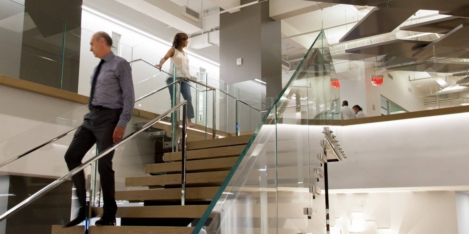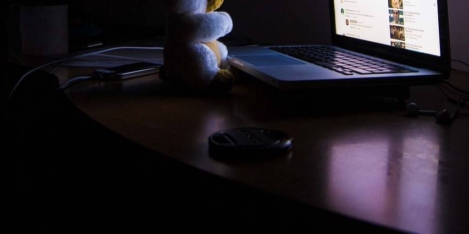May 24, 2018
Gallery: WeWork announces the opening of its flagship location in India
 WeWork has announced its first flagship Indian location in Bengaluru. WeWork Galaxy is located on the site of the former Galaxy Theatre, and features a rooftop terrace with a pool and gym in addition to a mix of shared and private offices, which are designed around a 5-storey communal atrium. Bengaluru is India’s tech capital and one of the country’s leading cultural and economic hubs and so WeWork see it as a perfect fit for their coworking model. Created by the in-house design team, the goal was to create a space that ‘felt open, yet communal and intimate for members and guests, by creating individual programming and design moments within the atrium space’.
WeWork has announced its first flagship Indian location in Bengaluru. WeWork Galaxy is located on the site of the former Galaxy Theatre, and features a rooftop terrace with a pool and gym in addition to a mix of shared and private offices, which are designed around a 5-storey communal atrium. Bengaluru is India’s tech capital and one of the country’s leading cultural and economic hubs and so WeWork see it as a perfect fit for their coworking model. Created by the in-house design team, the goal was to create a space that ‘felt open, yet communal and intimate for members and guests, by creating individual programming and design moments within the atrium space’.














 UK office workers spend an alarmingly limited amount of time outdoors each day, claims new research from Ambius, which found that almost 40 percent spend a maximum of just 15 minutes outside, excluding their commute to work, and an additional 22 percent spend a maximum of 30 minutes outside. This is even less than prisoners, who require ‘at least one hour of suitable exercise in the open air daily’, according to UN guidelines. On average, the British workers surveyed spend more time per day at their desk or workstation (6.8 hours) than they do in bed (6.4 hours), relaxing at home (3.5 hours) or outdoors (37 mins). A lack of fresh air (57 percent), insufficient natural light (49 percent), and an absence of indoor plants (36 percent) were the biggest source of frustration for employees. Introducing indoor plants (49 percent), nicer artwork (50 percent), and a more interesting colour scheme (54 percent), topped the list of employees’ requests to improve their workplace.
UK office workers spend an alarmingly limited amount of time outdoors each day, claims new research from Ambius, which found that almost 40 percent spend a maximum of just 15 minutes outside, excluding their commute to work, and an additional 22 percent spend a maximum of 30 minutes outside. This is even less than prisoners, who require ‘at least one hour of suitable exercise in the open air daily’, according to UN guidelines. On average, the British workers surveyed spend more time per day at their desk or workstation (6.8 hours) than they do in bed (6.4 hours), relaxing at home (3.5 hours) or outdoors (37 mins). A lack of fresh air (57 percent), insufficient natural light (49 percent), and an absence of indoor plants (36 percent) were the biggest source of frustration for employees. Introducing indoor plants (49 percent), nicer artwork (50 percent), and a more interesting colour scheme (54 percent), topped the list of employees’ requests to improve their workplace.






 It can be proven that a well implemented Occupational Health service can offer a good return on investment, finds a new report. A white paper, produced by the Society of Occupational Medicine (SOM), the International SOS Foundation and KU Leuven University,
It can be proven that a well implemented Occupational Health service can offer a good return on investment, finds a new report. A white paper, produced by the Society of Occupational Medicine (SOM), the International SOS Foundation and KU Leuven University, 











June 1, 2018
How our noisy world was foreseen by the 20th Century’s great minds
by Charles Marks • Comment, Wellbeing, Workplace design
More →